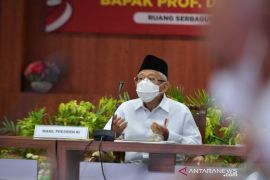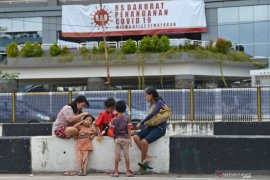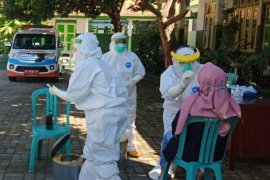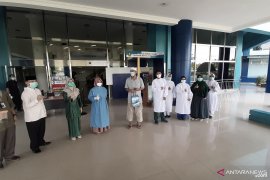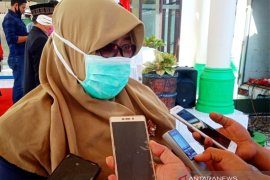The Indonesian government has projected unemployment in Indonesia to rise by five million in the face of the economic pressure caused by the COVID-19 outbreak.
The forecast aligns with Indonesia's economic growth in its worst-case scenario that is expected to contract, according to Head of the Fiscal Policy Agency (BKF) of the Financial Ministry Febrio Nathan Kacaribu.
In the baseline scenario, the national economic growth would decline to 2.3 percent of the gross domestic product (GDP), and this would result in an additional 2.9 million becoming jobless, he had stated on April 20, 2020.
The government will make all-out efforts to maintain economic stability amid pressure from the COVID-19 pandemic to contain the impact on the nation’s unemployment rate, he remarked.
Earlier, Chief of the Task Force for Acceleration of COVID-19 Response Doni Monardo noted that some 1.6 million workers were laid off and forced to take unpaid leave due to the pandemic.
"Reports from ministers show that 1.6 million workers have been laid off and forced to take unpaid leave, and that pre-employment cards must be issued to them soon," he stated following a limited meeting led by President Joko Widodo at the Merdeka Palace on April 7.
The government has allocated social safety net funds, amounting to Rp110 trillion, to help fulfill the basic requirements of those at the grassroots level during the COVID-19 pandemic.
"Since these programs are important for the people, I order that distribution be done as soon as possible, as quickly as possible, precisely and swiftly," the president stated while chairing a limited cabinet meeting on the Effectiveness of Social Safety Net Distribution Program held through videoconference from the Bogor Palace, West Java, on April 7, 2020.
The government has, until now, increased the number of beneficiary families for the Family of Hope Program, from 9.2 million recipients to 10 million, and has also ramped up the value of benefits by approximately 25 percent, in addition to expediting the distribution, from three months to once a month.
The number of beneficiaries for the basic staple food program was raised, from 15.2 million recipients to 20 million, and the funds were hiked by 30 percent, from Rp150 thousand to Rp200 thousand, offered for nine months.
Furthermore, the government has launched the pre-employment card program since April 9 by allocating budget worth Rp20 trillion, with beneficiaries reaching 5.6 million, especially those impacted by layoffs, informal workers, and MSME actors bearing the brunt of the COVID-19 pandemic.
The government has also announced free electricity for 24 million 450 KVa customers and a 50-percent discount for seven million 900 KVa customers in April, May, and June.
The government plans to raise the capacity of participants and the budget for the pre-employment card program in the coming second phase in response to the high level of interest in the program among community members.
According to a press release sent by the Presidential Staff Office in Jakarta, the first wave of the Pre-Employment Card registration process was closed for participants on April 16.
The program had a total of 5.7 million registrants, of which the status of 3.1 million participants was verified. Its budget has been increased to Rp20 trillion, and MSMEs will receive a special allocation.
"The capacity of participants was increased, from 164,000 to 200,000 people. The level of enthusiasm among the people from 34 provinces was very high. This is the first government program that utilizes a digital system to offer open access and equal opportunity, and anyone can register," Coordinating Minister for Economic Affairs Airlangga Hartanto had stated on April 17.
Initial selection was conducted to gauge the participants’ enthusiasm to join this program. The participants of the pre-employment program are over 18 years of age and are not in school and not availing social assistance programs.
The government will verify with the data sources from several ministries and institutions.
"All of this becomes a database and is cross-checked with the incoming data. Hence, all programs are based on active registration," he expounded.
The pre-employment program, utilizing a digital system based on the e-learning concept, with young registrants constituting the majority, offers a training to hone skills.
Over 900 online trainings of various types and levels, ranging from beginner to advanced levels, will be available on eight digital platforms, mostly practical, simple training types that could generate income.
The training guides will comprise Introduction to Information Technology for Beginners, Accounting for Beginners, Young Da'i Training, Becoming a Reliable MC, Coffee Shop Management, Practical English for Tourism Guides, Basic Housekeeping Skills, and Learning to Become a Telemarketer.
Since its launch on March 20, 2020, until Apr 12, the pre-employment program’s official site www.prakerja.go.id has received 2.4 million unique visitors. More than 1.1 million viewers were recorded when the first phase of registration was opened on the first day. Related news: President bans "mudik" for citizens to contain COVID-19 spread
Related news: Central Jakarta COVID-19 Task Force to isolate patients at schools
Related news: 1,000 COVID-19 affected families in Ambon receive aid
Editor: Rahmad Nasution
Copyright © ANTARA 2020

